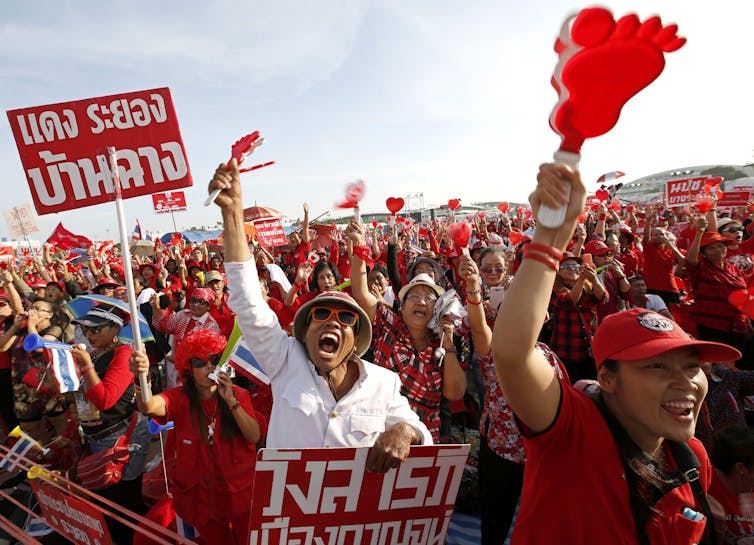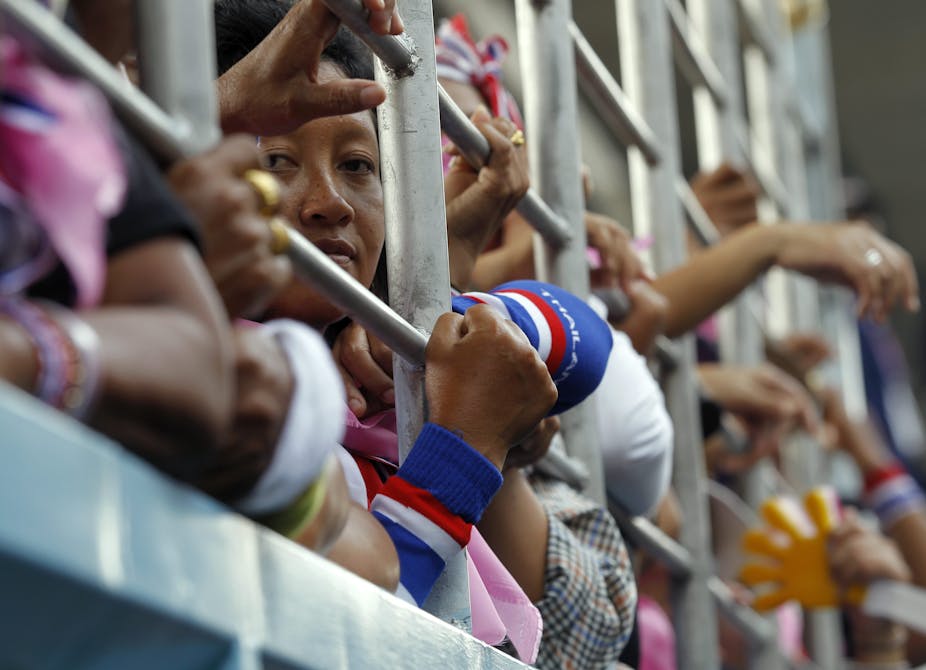I walk from my apartment of a morning along a small street, on which local police supposedly provide protection but are not to be seen. The street enters a main road leading to the largest rally site in Bangkok. From here, the protesters’ own security personnel are in charge.
Vehicle traffic into the site is blocked except for cars owned by local residents and vehicles destined for neighbouring high-end malls, transporting protesters, or servicing the site and its many stalls. Music and speeches begin quite early on the site’s sound stage.
I am checked by the protesters’ security, but the examination is cursory - as it is even when I come down from the skytrain into the site fairly late at night. At any time I could be concealing a grenade as did some person or persons unknown who exploded grenades at sites in the country and outside the city’s Central World mall over the weekend.
Beyond the protest sites, though, is a different world of long-running confrontations, the latest being over the fate of the caretaker government. Court and administrative actions plotted by various protest groups allied with the People’s Democratic Reform Committee led by Suthep Thaugsuban are designed to bring the government down. Counter-actions are devised by the government’s Centre for Maintaining Power and Order under the direction of a deputy prime minister, Chalerm Yubamrung (Suthep’s nemesis and a man with a dubious background indeed).
In this other world, it has to be presumed, attempts are also being made (brokered by senior military, academic and business leaders) to negotiate some settlement of the conflict.
The battle behind the scenes
The governance of Thailand is difficult to understand in terms of the country’s formal institutional structure. The roles of parliament have been regularly debased, and not only by Yingluck Shinawatra’s government, as when it forced through the passage of the notorious amnesty bill. Legislation is routinely corrupted.
Loose and contentious interpretations of the extant constitution are not uncommon. The Constitution Court’s judgments on the wide range of matters referred to it seem frequently to be tortured. The military has a habit of overthrowing elected governments and throwing out inconvenient constitutions.
The processes of the civil service have been crippled. The detailed provisions of the decree imposing the present state of emergency in Bangkok can be ignored or deferred. Representative government can be vitiated by the orders of a person who has exiled himself from the country; and so on and so on.
The informal institutional structure includes networks, codes of deference and loyalties to kin, bonds formed during past struggles, fellow club members, classmates at military and police academies (and at prestigious universities and selective high schools), fellow members of scams and conspiracies to corrupt etc. Formal institutions can be submerged under such a weight.
One informal institution - and it has been a very powerful one, distinct from the formal institution of the monarchy - is the code of deference to the king. This is so especially in respect of his extra-constitutional, personal involvement in national conflicts such as that which ended the Suchinda Kraprayoon government in 1992.
The Thai people still seem to believe that recourse can be had to this reserve institution. It is not so: the king is too old and infirm and even his right-hand man, the redoubtable president of the Privy Council, is 93 years of age and tiring.
Under the state of emergency, the police have powers to arrest protest leaders, but by and large have chosen not to do so. Only one or two unsuccessful attempts have been made and the Criminal Court has thrown out several arrest warrants this week. Police have hitherto been able to limit the rights of citizens to assemble in large numbers but again have not done so. Nor have they forcibly contested the illegal colonisation of public spaces by one section of the public.
However, just when some tentative (and poorly executed) moves had been taken to return rally sites to the state and to end occupations of government buildings, the Civil Court ruled that the government cannot use force to do so. The court found this would limit protesters’ right to assemble and demonstrate peacefully. This is under appeal.
The court judged that the demonstrations had been peaceful but gave notice that protesters had to remain peaceful. None of this is to say that the police have at any time been able to move on the rally sites without the risk of violence, injuries and deaths, such as occurred on February 18.
Deadlier conflict looms
On that Tuesday, push came to shove in Bangkok as the protesters confronted police outside Government House. The Centre for Maintaining Peace and Order (CMPO), which deploys the police force, had warned that it had begun reclaiming sites occupied by the People’s Democratic Reform Committee (PDRC). Various protest groups represented by the PDRC were rallied by Suthep Thaugsuban to march to Government House to reinforce members defending the barricades erected there.
The clash at Government House led to five deaths, at least one of them of a policeman, after a grenade was thrown among police attempting to push back the protesters. It is alleged that the police reacted by firing live ammunition as well as tear gas, stun grenades and rubber bullets, killing two protesters in turn.
The police say they want to be free of immediate political control. However, they have more to worry about than politicians and their strategies.
According to a report in the Bangkok Post, each side is supported by paramilitary “men in black” who are available as agents provocateur or even for assassinations. They may have been involved in the clash on February 18. CMPO is said to be about to recruit the legendary strong man, Panlop Pinmanee, to advise on dealing with the “men in black”.

The protesters in Bangkok accuse the government of undermining the formal institutions of governance. They themselves wish to displace parliament and elections.
According to The Nation of February 21, the opposition has persuaded the courts and “independent agencies” (such as the National Anti-Corruption Commission and the Ombudsman of Thailand, most of whose members were appointed by the previous Democrat-led government) to accept seven cases or petitions against the prime minister in an effort to force her to resign. She has been charged more recently with murder over the deaths on February 18; while serious, this tit-for-tat charge will have no immediate impact. The PM, who vowed on Monday not to resign, is said to be operating from a “safe house”!
Another of the “independent agencies”, the Election Commission, is being asked to proceed with the “completion” of elections that were scheduled for February 2. The rub for the government is that, even if it were possible to hold the extra elections despite protesters’ hindrances, the Constitution Court would very likely declare the entire set of elections null and void.
Adding fuel to the fire is the reaction of farmers to the debacle of the rice mortgage scheme - they have not been paid for months. The caretaker government has few ways open to it of making payments to assuage farmers’ anger.
In the past few days, Suthep has also led a clumsy siege of companies associated with the Shinawatra name. As of the weekend, it appears that the pro-government red-shirt organisation, the United Front for Democracy against Dictatorship (UDD), has become impatient with the government’s response. The red shirts have begun to mobilise and are sounding the “battle drums”.
As the Neros fiddle here in Bangkok, not only does the economy falter badly, not only do killings and injuries continue and not only do ordinary citizens suffer great difficulties and tensions after three months of disruptions, but the south burns and burns.

